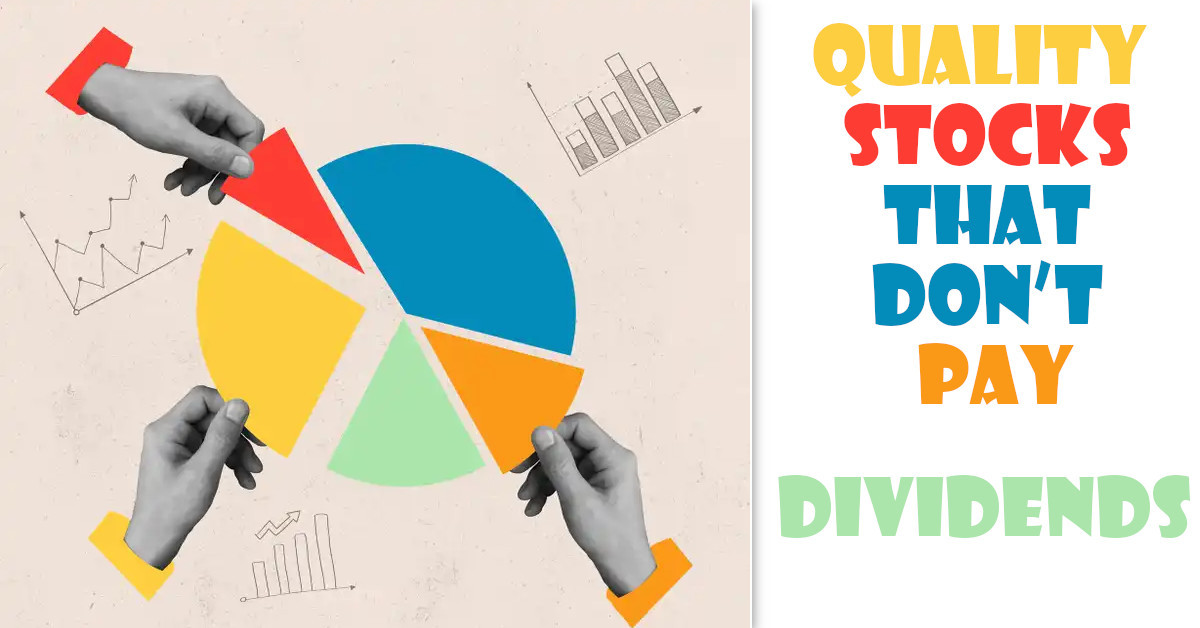Quality stocks are stocks of companies that have strong fundamentals, such as high profitability, low debt, consistent earnings growth, and competitive advantage. Quality stocks are attractive for investors and traders because they tend to outperform the market in the long run and offer stability and resilience in times of uncertainty.
Some quality stocks do not pay dividends, which means they do not distribute a portion of their earnings to shareholders as cash payments. Instead, they reinvest their earnings back into the business to fund growth, innovation, and expansion. This affects their valuation in different ways, depending on the perspective of the investor or the trader.
Benefits of trading quality stocks that do not pay dividends
- Higher growth potential: Quality stocks that do not pay dividends can grow faster than dividend-paying stocks, as they have more capital to invest in new opportunities, research and development, acquisitions, and market share. This can lead to higher returns for investors and traders who can capitalize on the appreciation of the stock price.
- Lower payout ratio: Quality stocks that do not pay dividends have a lower payout ratio, which is the percentage of earnings that are paid out as dividends. A lower payout ratio indicates that the company is retaining more of its earnings for growth, which can improve its financial health and sustainability. A lower payout ratio also means that the company has more flexibility to adjust its dividend policy in the future, if needed.
- Greater flexibility for management: Quality stocks that do not pay dividends give more freedom and discretion to the management of the company, as they do not have to meet the expectations and demands of dividend-seeking investors. This allows the management to focus on the long-term vision and strategy of the company, rather than the short-term fluctuations of the market.
- Tax advantages for investors: Quality stocks that do not pay dividends can offer tax benefits for investors, especially in countries where dividends are taxed at a higher rate than capital gains. By trading quality stocks that do not pay dividends, investors can defer their tax liability until they sell their shares, and potentially pay a lower tax rate on their profits.
Let’s check out some examples of companies that do not pay out dividents
Amazon is one of the largest and most dominant e-commerce and technology companies in the world, with a market capitalization of over $1.7 trillion. Amazon has never paid a dividend, as it reinvests its earnings into expanding its business segments, such as cloud computing, online retail, streaming, artificial intelligence, and more. Amazon has grown its revenue by an average of 28% per year over the past decade, and its stock price has increased by over 1,600% in the same period.
Google is the leading search engine and online advertising platform in the world, with a market capitalization of over $1.5 trillion. Google has also never paid a dividend, as it allocates its earnings to enhance its core products, such as Google Search, YouTube, Gmail, Google Maps, and more, as well as to develop new ventures, such as Google Cloud, Waymo, Google Fiber, and more. Google has grown its revenue by an average of 19% per year over the past decade, and its stock price has increased by over 500% in the same period.
Netflix is the world's largest streaming service, with over 200 million subscribers and a market capitalization of over $250 billion. Netflix has also never paid a dividend, as it spends its earnings on producing and acquiring original content, such as movies, shows, documentaries, and more, as well as on expanding its global presence and reach. Netflix has grown its revenue by an average of 29% per year over the past decade, and its stock price has increased by over 2,000% in the same period.
There are also some risks and challenges of investing in quality stocks that do not pay dividends:
Higher volatility: Quality stocks that do not pay dividends can be more volatile than dividend-paying stocks, as they are more sensitive to the changes and uncertainties in the market, the industry, and the economy.
Quality stocks that do not pay dividends can also experience more fluctuations in their earnings and cash flows, as they depend more on the growth and performance of their business operations. This can lead to higher risk for investors and traders who may face more price swings and losses.
Lower income stream: Quality stocks that do not pay dividends can provide a lower income stream for investors and traders who rely on dividends as a source of regular and stable income.
Quality stocks that do not pay dividends can also have a lower dividend yield, which is the annual dividend per share divided by the current share price. A lower dividend yield can make quality stocks that do not pay dividends less attractive and competitive compared to other income-generating assets, such as bonds, real estate, and dividend-paying stocks.
Higher opportunity cost: Quality stocks that do not pay dividends can have a higher opportunity cost for investors and traders who forego the potential income and returns from investing in dividend-paying stocks or other assets.
Quality stocks that do not pay dividends can also have a lower total return, which is the sum of the capital gain and the dividend income, if the capital gain does not exceed the dividend income that could have been earned from investing in dividend-paying stocks or other assets.
Regulatory uncertainty: Quality stocks that do not pay dividends can face regulatory uncertainty and scrutiny, as they may be subject to changes in the tax laws, the antitrust laws, the privacy laws, and other regulations that could affect their business models, profitability, and valuation.
Quality stocks that do not pay dividends can also face more pressure and challenges from the government, the public, the competitors, and the stakeholders, as they may be perceived as too powerful, too dominant, or too influential in their respective markets and industries.
Conclusion
In conclusion, quality stocks that do not pay dividends are stocks of companies that have strong fundamentals, but do not distribute their earnings to shareholders as cash payments. Quality stocks that do not pay dividends can offer several benefits, such as higher growth potential, lower payout ratio, greater flexibility for management, and tax advantages for investors. However, quality stocks that do not pay dividends can also pose some risks and challenges, such as higher volatility, lower income stream, higher opportunity cost, and regulatory uncertainty.
Therefore, investors and traders who are interested in quality stocks that do not pay dividends should carefully weigh the pros and cons of trading these stocks, and consider their own goals, preferences, risk tolerance, and time horizon. CFD traders who are looking for quality stocks to trade also can get adjusted dividends from IFC Markets that also offers a wide range of trading instruments, platforms, tools, and resources.
Good luck and happy trading!


















